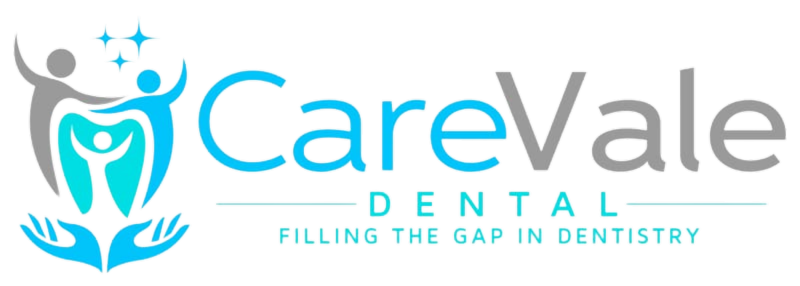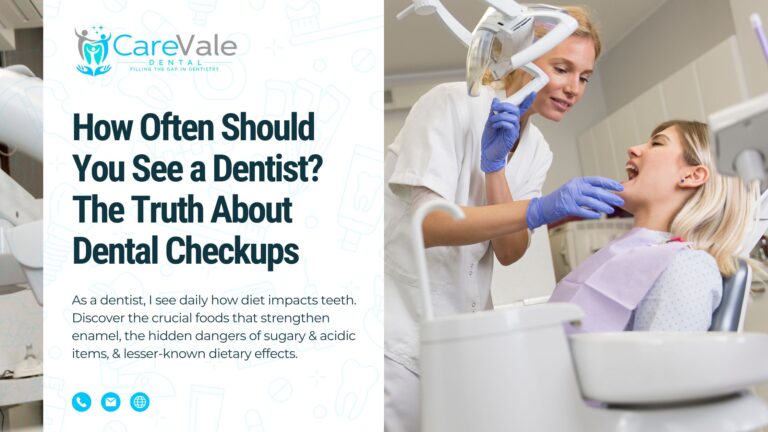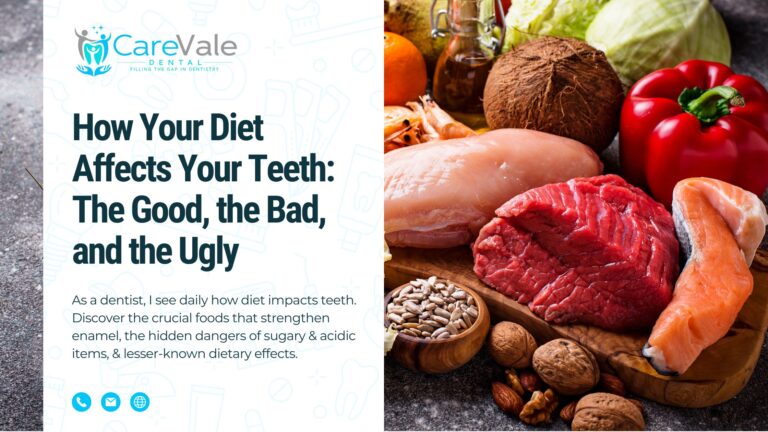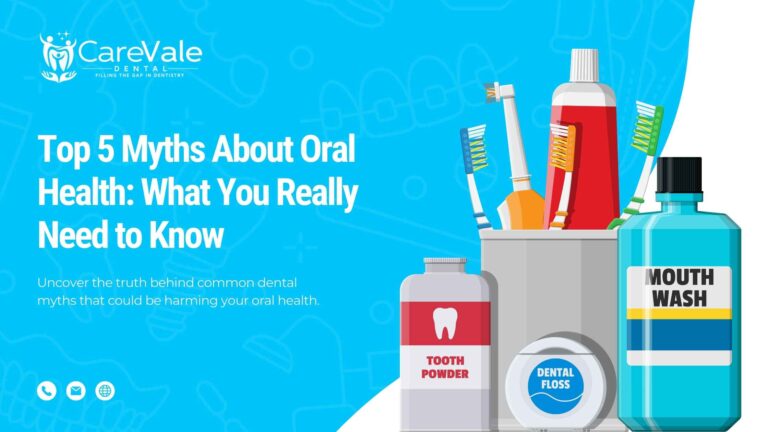Call us: 095083 92120 / Email us: carevaledental@gmail.com
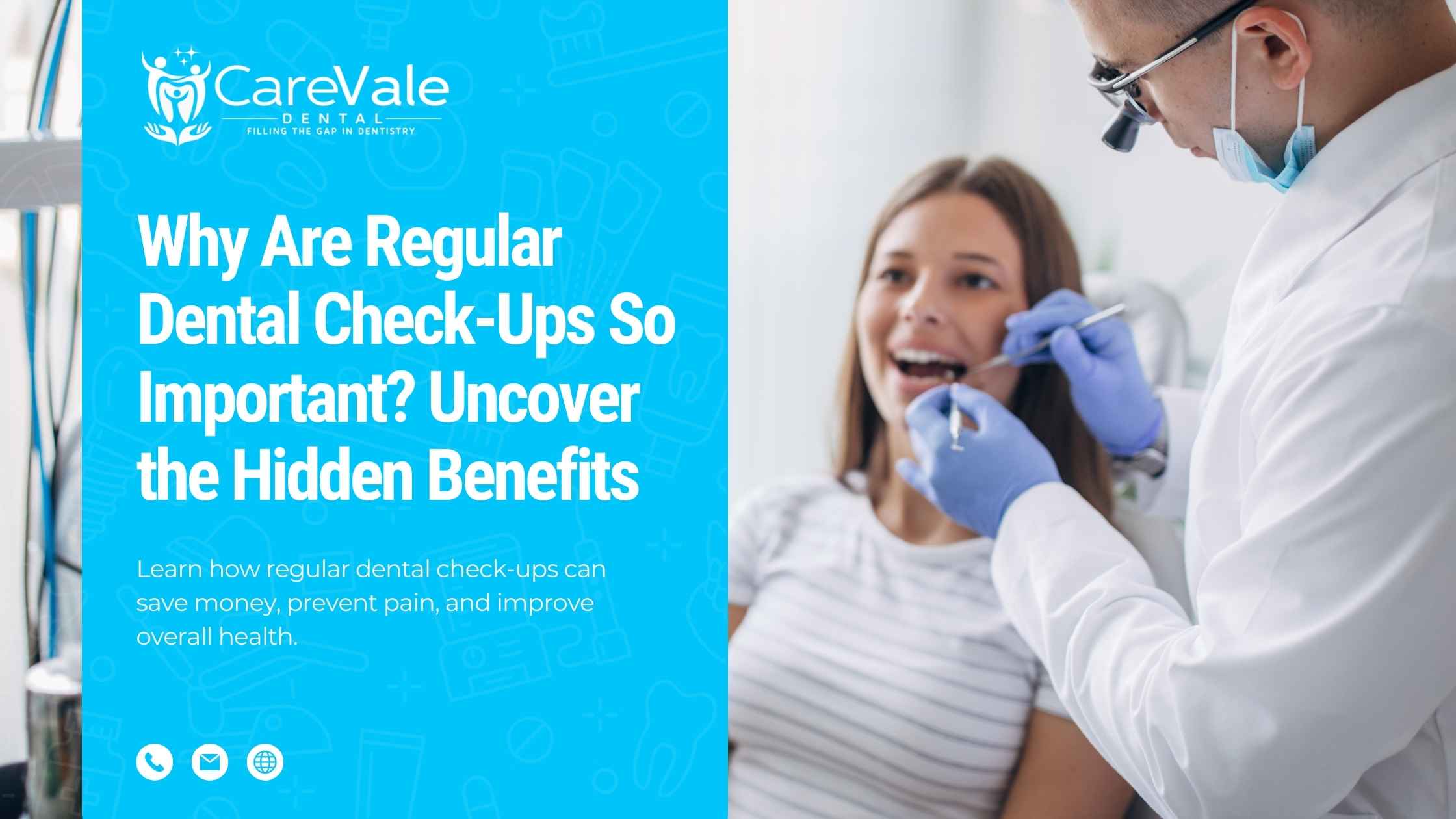
Why Are Regular Dental Check-Ups So Important? Uncover the Hidden Benefits
As a dental surgeon, I’ve seen firsthand the devastating effects of neglecting oral health. What may seem like a minor toothache can quickly escalate into a major dental problem, causing significant pain, discomfort, and financial burden. That’s why I strongly advocate for the importance of preventive dental care.
Regular dental check-ups are the cornerstone of maintaining optimal oral health. By scheduling routine appointments, you’re investing in your long-term well-being. These check-ups allow me to identify potential issues early on, preventing them from worsening and saving you from costly procedures down the line.
The Long-Term Benefits of Regular Dental Check-Ups
Regular dental check-ups are more than just a routine appointment; they’re an investment in your overall health. By visiting your dentist every six months, you can reap numerous long-term benefits.
Early Detection of Oral Health Issues
One of the primary advantages of regular dental check-ups is the early detection of oral health issues. As your dentist, I’m trained to identify potential problems, such as cavities, gum disease, and oral cancer, at their earliest stages. Early detection allows for timely intervention, preventing these conditions from worsening and saving you from more invasive and costly treatments.
Preventive Measures
During your check-ups, I’ll also perform preventive measures to protect your oral health. These may include:
- Professional Cleaning and Polishing: Regular cleaning removes plaque and tartar buildup, reducing your risk of gum disease and cavities.
- Fluoride Treatments: Fluoride strengthens your tooth enamel, making it more resistant to acid attacks.
- Dental Sealants: Sealants are a protective coating applied to the chewing surfaces of your teeth, preventing food particles and bacteria from getting trapped in the grooves.
Maintaining Oral Health
While regular dental check-ups are crucial, it’s equally important to maintain good oral hygiene at home. Here are some tips to keep your teeth and gums healthy:
- Brush your teeth twice a day with a fluoride toothpaste.
- Floss daily to remove plaque and food particles from between your teeth.
- Use a mouthwash to kill bacteria and freshen your breath.
- Limit your intake of sugary foods and drinks.
- Consider a healthy diet rich in fruits, vegetables, and whole grains.
By following these simple tips and scheduling regular dental check-ups, you can enjoy a lifetime of healthy smiles.
The Cost of Neglecting Dental Care
While preventive dental care may seem like an added expense, neglecting your oral health can lead to significant costs, both immediate and long-term.
Immediate Costs
- Emergency Dental Procedures: When dental problems are left untreated, they can worsen and require urgent attention. Emergency procedures, such as root canals or tooth extractions, can be quite expensive.
- Pain and Discomfort: Dental issues, such as toothaches and gum infections, can cause significant pain and discomfort, affecting your quality of life.
- Lost Productivity: Severe dental pain can make it difficult to concentrate, work, or sleep, leading to reduced productivity and potential job loss.
Long-Term Costs
- Systemic Health Issues: Poor oral health has been linked to various systemic health problems, including heart disease, stroke, and diabetes. Treating these underlying health conditions can be costly and time-consuming.
- Tooth Loss: Advanced gum disease can lead to tooth loss, which can impact your ability to eat, speak, and smile. Replacing missing teeth with dentures, bridges, or implants can be a significant financial burden.
- Cosmetic Concerns: Untreated dental problems can lead to visible issues like stained teeth, chipped teeth, or gaps between teeth, affecting your self-confidence and social interactions.
By prioritizing regular dental check-ups and good oral hygiene, you can avoid these costly consequences and maintain a healthy, beautiful smile.
Conclusion
In conclusion, prioritizing preventive dental care is essential for maintaining optimal oral health and overall well-being. Regular dental check-ups allow me to identify and address potential issues early on, saving you from pain, discomfort, and costly procedures. By combining regular dental visits with good oral hygiene practices, you can enjoy a lifetime of healthy, beautiful smiles.
Remember, your oral health is an investment. Don’t neglect it. Schedule your next dental appointment today and take the first step towards a healthier, happier you.
Frequently Asked Questions (FAQs)
Q: How often should I visit the dentist for a regular check-up?
A: It’s generally recommended to visit your dentist every six months for a routine check-up and cleaning. However, the frequency may vary depending on your individual oral health needs.
Q: What happens during a regular dental check-up?
A: During a regular dental check-up, I’ll examine your teeth and gums for signs of decay, gum disease, or other oral health issues. I’ll also clean your teeth to remove plaque and tartar buildup.
Q: What are the signs of gum disease?
A: Some common signs of gum disease include bleeding gums, swollen gums, red or tender gums, persistent bad breath, and loose teeth. If you notice any of these symptoms, it’s important to see your dentist right away.
Q: How can I prevent tooth decay?
A: To prevent tooth decay, it’s essential to practice good oral hygiene. This includes brushing your teeth twice a day with fluoride toothpaste, flossing daily, and using a mouthwash. Additionally, limiting your intake of sugary foods and drinks can help reduce your risk of cavities.
Q: Can poor oral health affect my overall health?
A: Yes, poor oral health has been linked to a variety of systemic health conditions, including heart disease, stroke, and diabetes. Bacteria from your mouth can enter your bloodstream and contribute to these health problems.
Q: What are some common dental myths?
A: There are many myths about dental health. Some common myths include:
- Myth: Only brush your teeth in the morning.
Fact: It’s important to brush your teeth twice a day, both morning and night. - Myth: Sugar is the only cause of cavities.
Fact: While sugar can contribute to tooth decay, poor oral hygiene is the primary cause. - Myth: Only floss when you have food stuck between your teeth
Fact: Flossing is important for removing plaque and food particles from between your teeth, even if you don’t feel anything stuck.
By addressing these common questions, you can empower your patients to make informed decisions about their oral health and take steps to maintain a healthy, beautiful smile.
